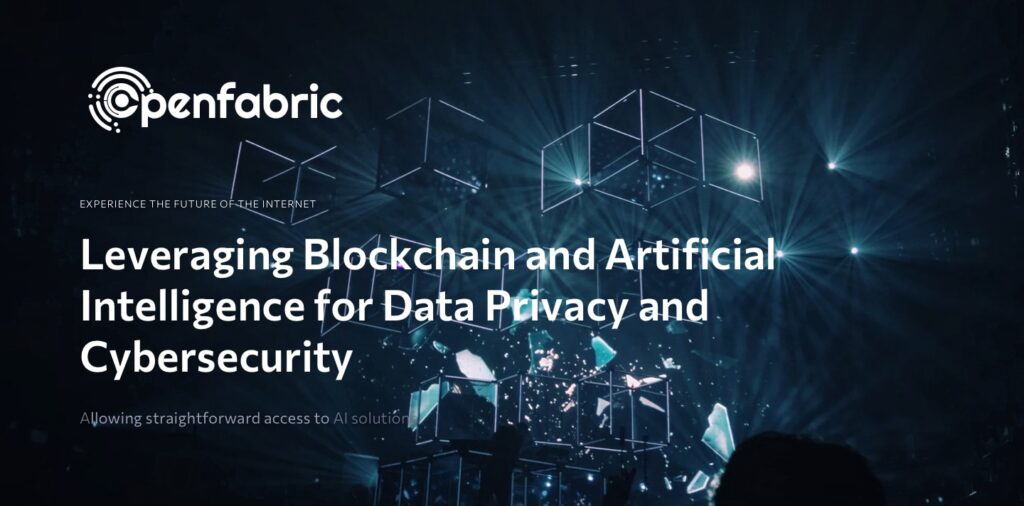
September 10, 2021 6 minutes read
Leveraging Blockchain and AI for Privacy and Cybersecurity

Cybersecurity advances and new legislation has coupled with systems powered by blockchain and artificial intelligence. This can usher in a new era of automated, transparent and cost-effective, and privacy and security applications.
The last few years have seen a massive increase in high-level security breaches. This shows the need for better privacy and security controls. It is especially needed when users’ personal data is involved.
In this article, we are going to discuss what these cyber security systems can potentially do and how Openfabric’s decentralized AI solutions can help bring about this needed change.
Background
Thanks to the exponential increase in the amount of data being generated and collected, businesses have been able to create services personalized to the level of individual users. Examples of such businesses are typically centralized organizations such as Amazon, Google, and Facebook. Their central data repositories are highly sought-after targets for cybercriminals.
Large-scale breaches such as the Equifax data breach of 2017 was a turning point in cyber security. This affected over 140 million customers forcing the industry to look for alternative ways to store and manage sensitive data.
Together, blockchain and artificial intelligence (AI) can help protect and secure personal data. They can:
- Provide users with control how their personal data is used.
- They can also prevent the impact of cyber threats while ensuring that private data and the models built on that data are reliable.
What is Importance of Data Privacy
Personal data consists of data on the following
- Individual records
- Familie records
- Credit scores and financial records
- Business leads, investors, and more.
Such data is typically protected on private servers in encrypted and/or anonymized form. Unfortunately, it is still possible for this data to be linked to individual users.
Data such as biometrics, browsing habits, social security numbers, addresses, birthdays, and more are what many of today’s most recognizable names in the tech space have built their empires upon. The power to preserve the integrity of this type of personally identifiable information (PII) is a strategic requirement for many organizations.
Data and Privacy Breaches
Information security is the branch of cybersecurity that focuses on protecting the integrity and privacy of data when it is captured, stored, and used. However, despite significant advances in software applications and security protocols, privacy breaches are all too common and on the rise.
According to Risk Based Security’s 2020 Year-End Report, there were over 37 billion compromised data records in 2020 – over 140% higher than 2019. Unauthorized access to private databases allows malicious actors to gain access sensitive personal information like passwords and credit card numbers. The subsequent issues that arise, such as fraud and identity theft, cost society billions of dollars annually to address. In most cases, such issues take months or years per case.
As more data is collected, so does the frequency of attacks, complexity, and impact. Therefore, we need to rethink how we secure data. Let’s think blockchain and AI technology.
Privacy Regulations
In a bid to combat these attacks, new regulations such as the General Data Protection Regulation (GDPR – passed in the EU in 2016) and the California Privacy Rights Act (CPRA) that expanded on the 2018 California Consumer Privacy Act (CCPA) were formulated. It generally give users the right to:
- Know what kinds of personal data of theirs is being collected.
- Know if their data is ever sold or disclosed to others, and if yes, to whom.
- Refuse the sale of their personal data.
- Access their personal data.
- Request a business to delete their personal data.
- Not to be discriminated against for exercising their privacy rights.
While these types of privacy laws can improve how companies protect consumer data. However, implementing the systems and practices that can help them do that can be challenging.
This is where blockchain and distributed ledger technology (DLT) can help with compliance.
Data Privacy in Blockchain and Artificial Intelligence
One of the most important benefits of blockchain-based solutions is that they allow organizations to share data in ways that were not previously possible. This opens up new ways to collaborate, improve operational efficiencies, and tap into new revenue streams.
It is of the utmost importance for blockchain architects to consider who can read and write transactions to a shared ledger and how data and transactions are broadcast, authenticated, and stored. There are, however, many ways that private data can be secured in blockchain applications.
Let’s take a look at them
- Decentralized identities: this refers to when individuals have ownership rights over their data that relate to identity. Personal data can be stored on private databases. Blockchain-stored pointers can then be used to interact with or verify that data. Such solutions have rich applications in licensing, insurance, and healthcare.
- Zero-knowledge proofs allow data access while maintaining privacy and data control for individuals. They can be used to mathematically verify that a statement or condition is true without revealing any data.
Artificial Intelligence and Data Privacy
This brings us to the uses of artificial intelligence for data privacy. AI is currently used in a wide range of disciplines, including speech and facial recognition, medical diagnosis, financial modeling, and more. AI applications can be trained with data without having to own or control that data. This reduces the exposure level of the organizations and stakeholders who provide that data.
Some of the ways that AI can improve security and safeguard privacy are:
- Detecting malicious attacks to enhance system security.
- Allow users to decide what data they want to share using smart contracts that enforce permissioning.
- Automatically extracting insights and cleaning large datasets.
- Tapping into a wider range of data types and building better, more realistic, and more authentic AI models.
Emerging Uses Cases
There are many industries and verticals in which blockchain and artificial intelligence systems are changing. Medical researchers have gathered intelligence on virus transmission and used AI models to guide decision-making. Smart cities are using embedded sensors and edge devices to empower smart cargo tracking, resource allocation, and real-time power generation and distribution
Blockchain architectures can make it easier and more cost-effective to rent or share transportation and homes. AI on the other hand, can be used to:
- Process license applications
- Generate contracts
- Dynamically change insurance or utility fees based on usage.
- Conserve energy by switching off appliances or systems such as HVAC equipment when they are not needed
- Reducing intermediaries to facilitate cheaper funds transfers.
The list goes on and on, and there are new, innovative ways we can now share and combine data that were never before possible. What we need now is a better way to create, disseminate, and help monetize the AI applications that can make all of the changes above possible.
Openfabric’s Blockchain-Powered Artificial Intelligence Platform
Openfabric envisions a world in which everyone has quick, easy, low-cost, and hassle-free access to the data and algorithms needed to create better, faster, cheaper, and more personalized services. The platform is built with decentralization, security, scalability, interoperability, and ease-of-use at its core. It is specially designed to help anyone who wishes to tap into the vast potential of AI algorithms and applications built and published by innovators to create products, services, and solutions of their own. This has the potential to power a new wave of innovation and advancement.
Just as basic internet access drove many of the most important technological innovations of the last 20 years. To learn more about how Openfabric is creating a seamless, effective, integrated, and hassle-free artificial intelligence access platform for all, visit us at openfabric.ai.

